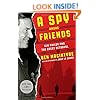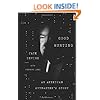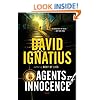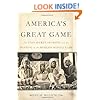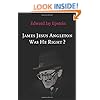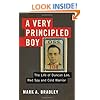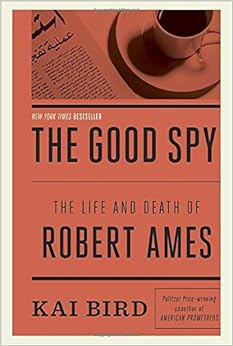
The Good Spy: The Life and Death of Robert Ames
and over one million other books are available for Amazon Kindle. Learn more


Flip to back
Flip to front


The Good Spy: The Life and Death of Robert Ames Hardcover – Deckle Edge, May 20, 2014
See all 6 formats and editions
Hide other formats and editions
| Amazon Price | New from | Used from |
|
Audio CD, Audiobook, Unabridged
"Please retry"
|
$23.54 | $23.76 |

$16.45
FREE Shipping on orders over $35.
In Stock.
Ships from and sold by Amazon.com.
Gift-wrap available.
NO_CONTENT_IN_FEATURE
Start reading The Good Spy: The Life and Death of Robert Ames on your Kindle in under a minute.
Don't have a Kindle? Get your Kindle here, or download a FREE Kindle Reading App.
Don't have a Kindle? Get your Kindle here, or download a FREE Kindle Reading App.
Best Books of the Month
Want to know our Editors' picks for the best books of the month? Browse Best Books of the Month, featuring our favorite new books in more than a dozen categories.
Want to know our Editors' picks for the best books of the month? Browse Best Books of the Month, featuring our favorite new books in more than a dozen categories.
Product Details
Would you like to update product info or give feedback on images?.
|
Editorial Reviews
Review
“Cool and authoritative…The book’s understated pleasures come from reading a pro writing about a pro. Mr. Bird has a dry style; watching him compose a book is like watching a robin build a nest. Twig is entwined with twig until a sturdy edifice is constructed. No flourishes are required …. Mr. Bird’s style is ideal for his subject.”
—Dwight Garner, The New York Times
“Engrossing…This absorbing book suggests that even the best of intentions, and the best of spies, aren’t enough to bridge the chasms in the Middle East.”
—Los Angeles Times
“In his riveting, illuminating account of Ames' life and ultimate death in the 1983 embassy bombing in Beirut, Bird pulls back the thick black curtain on the world of clandestine intelligence affairs — a world that turns out to be more blazer-and-pen than cloak-and-dagger, though no less engrossing — to tell the story of one individual's good work in a not-so-good system. A”
–Entertainment Weekly
“One of the best nonfiction books ever written about the West’s involvement in the Arab world.”
—The Spectator
“More exciting than le Carré’s George Smiley or Fleming’s James Bond, Bird recreates the life of CIA superspy Robert Ames… Bird’s meticulous account of Ames’s career amid an ongoing Mideast climate of caution and suspicion is one of the best books on the American intelligence community.”
—Publishers Weekly (Starred Review)
“A moving biography within a balanced presentation of the complex diplomacy over the Palestinian quest for statehood and Israeli need for security.”
—Library Journal (Starred Review)
“A poignant tribute to a CIA Middle East operative who helped get the Palestinians and Israelis to talk to each other—and died for it.”
—Kirkus Reviews
“Kai Bird has produced a compelling and complex narrative that must be read on many levels—including as a detailed account of the immense influence that a truly good man can have on an agency as cynical as the CIA, and as a reminder of a myriad of losses. Robert Ames did not live long enough to get what he most desperately wanted—a real peace in the Middle East. And America's intelligence agencies no longer seem as welcoming to agents with the wisdom, vision and integrity that Ames exemplified.”
—Seymour Hersh, Pulitzer Prize-winning author of The Price of Power, The Dark Side of Camelot, and Chain of Command
“Kai Bird has delivered two miracles—the best day-by-day account of a secret intelligence career in the CIA, and the best book about the murderous intelligence war between Israel and her enemies with America smack in the middle. For years Robert Ames—The Good Spy—tried to nudge both sides toward peace until he picked the wrong day to visit the U.S. Embassy in Beirut and was killed by a car bomb. Bird has written a powerful and revealing story that leaves the reader with a troubling question—how did America get trapped in this war it can do nothing to end?”
—Thomas Powers, Pulitzer Prize-winning author of Intelligence Wars and The Man Who Kept the Secrets: Richard Helms and the CIA
“The Good Spy gives us the CIA up close and personal—the intricate dance of recruiting ‘assets,’ the bureaucratic maneuverings, the family compromises. But because Ames was a Mideast specialist his biography also becomes a knowing history of that region's political failures and relentless descent into violence. Well reported, even-handed, compelling reading -- one of the best books ever written about the CIA.”
—Joseph Kanon, New York Times bestselling author of Los Alamos and The Good German
"Beautifully written and researched, The Good Spy is the best book I've ever read on espionage. It perfectly captures the CIA at its best. What's more, it's a book you can't put down, right to its tragic end. I need to add this: while Bob Ames's career and mine crossed paths over the years, it's Kai Bird who has finally put the story together for me. Reading this, I wondered at times if Kai somehow pulled off a black bag operation to get into the Agency archives."
—Robert Baer, former CIA operative and New York Times bestselling author of See No Evil
“Kai Bird has unearthed an astonishing amount of detail about Robert Ames, the CIA, and U.S. spy operations in the Middle East. His book could not be more timely in showing us the perils and advantages of clandestine actions in the name of national security. The Good Spy gives new meaning to the adage that truth can be stranger than fiction.”
—Robert Dallek, author of the #1 New York Times bestseller An Unfinished Life: John F. Kennedy 1917-1963
"If John le Carré were a nonfiction specialist, he surely would feel the lure of writing the story that is at the heart of The Good Spy. Kai Bird works the seam between history and espionage. He has produced an arresting book—one that is knowing, and masterful in its rendition of a time when the United States cast a huge shadow across the Arab world. Robert Ames, the spy in Kai Bird's title, is a figure of unusual poignancy because his guile and innocence run side by side.”
—Fouad Ajami, Senior Fellow at The Hoover Institution, Stanford University, and author of The Syrian Rebellion
—Dwight Garner, The New York Times
“Engrossing…This absorbing book suggests that even the best of intentions, and the best of spies, aren’t enough to bridge the chasms in the Middle East.”
—Los Angeles Times
“In his riveting, illuminating account of Ames' life and ultimate death in the 1983 embassy bombing in Beirut, Bird pulls back the thick black curtain on the world of clandestine intelligence affairs — a world that turns out to be more blazer-and-pen than cloak-and-dagger, though no less engrossing — to tell the story of one individual's good work in a not-so-good system. A”
–Entertainment Weekly
“One of the best nonfiction books ever written about the West’s involvement in the Arab world.”
—The Spectator
“More exciting than le Carré’s George Smiley or Fleming’s James Bond, Bird recreates the life of CIA superspy Robert Ames… Bird’s meticulous account of Ames’s career amid an ongoing Mideast climate of caution and suspicion is one of the best books on the American intelligence community.”
—Publishers Weekly (Starred Review)
“A moving biography within a balanced presentation of the complex diplomacy over the Palestinian quest for statehood and Israeli need for security.”
—Library Journal (Starred Review)
“A poignant tribute to a CIA Middle East operative who helped get the Palestinians and Israelis to talk to each other—and died for it.”
—Kirkus Reviews
“Kai Bird has produced a compelling and complex narrative that must be read on many levels—including as a detailed account of the immense influence that a truly good man can have on an agency as cynical as the CIA, and as a reminder of a myriad of losses. Robert Ames did not live long enough to get what he most desperately wanted—a real peace in the Middle East. And America's intelligence agencies no longer seem as welcoming to agents with the wisdom, vision and integrity that Ames exemplified.”
—Seymour Hersh, Pulitzer Prize-winning author of The Price of Power, The Dark Side of Camelot, and Chain of Command
“Kai Bird has delivered two miracles—the best day-by-day account of a secret intelligence career in the CIA, and the best book about the murderous intelligence war between Israel and her enemies with America smack in the middle. For years Robert Ames—The Good Spy—tried to nudge both sides toward peace until he picked the wrong day to visit the U.S. Embassy in Beirut and was killed by a car bomb. Bird has written a powerful and revealing story that leaves the reader with a troubling question—how did America get trapped in this war it can do nothing to end?”
—Thomas Powers, Pulitzer Prize-winning author of Intelligence Wars and The Man Who Kept the Secrets: Richard Helms and the CIA
“The Good Spy gives us the CIA up close and personal—the intricate dance of recruiting ‘assets,’ the bureaucratic maneuverings, the family compromises. But because Ames was a Mideast specialist his biography also becomes a knowing history of that region's political failures and relentless descent into violence. Well reported, even-handed, compelling reading -- one of the best books ever written about the CIA.”
—Joseph Kanon, New York Times bestselling author of Los Alamos and The Good German
"Beautifully written and researched, The Good Spy is the best book I've ever read on espionage. It perfectly captures the CIA at its best. What's more, it's a book you can't put down, right to its tragic end. I need to add this: while Bob Ames's career and mine crossed paths over the years, it's Kai Bird who has finally put the story together for me. Reading this, I wondered at times if Kai somehow pulled off a black bag operation to get into the Agency archives."
—Robert Baer, former CIA operative and New York Times bestselling author of See No Evil
“Kai Bird has unearthed an astonishing amount of detail about Robert Ames, the CIA, and U.S. spy operations in the Middle East. His book could not be more timely in showing us the perils and advantages of clandestine actions in the name of national security. The Good Spy gives new meaning to the adage that truth can be stranger than fiction.”
—Robert Dallek, author of the #1 New York Times bestseller An Unfinished Life: John F. Kennedy 1917-1963
"If John le Carré were a nonfiction specialist, he surely would feel the lure of writing the story that is at the heart of The Good Spy. Kai Bird works the seam between history and espionage. He has produced an arresting book—one that is knowing, and masterful in its rendition of a time when the United States cast a huge shadow across the Arab world. Robert Ames, the spy in Kai Bird's title, is a figure of unusual poignancy because his guile and innocence run side by side.”
—Fouad Ajami, Senior Fellow at The Hoover Institution, Stanford University, and author of The Syrian Rebellion
About the Author
KAI BIRD is the coauthor or author of four previous books: American Prometheus, Crossing Mandelbaum Gate, The Chairman, and The Color of Truth. He is the recipient of a Guggenheim Fellowship and a MacArthur Writing Fellowship.
More About the Author
Kai Bird is a Pulitzer Prize-winning historian and biographer. His next book is The Good Spy: The Life and Death of Robert Ames. A biography of a CIA officer, The Good Spy will be released on May 20, 2014 by Crown/Random House. Kai's last book was a memoir about the Middle East entitled Crossing Mandelbaum Gate: Coming of Age Between the Arabs and Israelis, 1956-1978 (Scribner, April 27, 2010). It was a 2011 Finalist in the National Book Critics Circle Award for Autobiography. He is the co-author with Martin J. Sherwin of the Pulitzer Prize-winning biography, American Prometheus: The Triumph and Tragedy of J. Robert Oppenheimer (2005), which also won the National Book Critics Circle Award for Biography and the Duff Cooper Prize for History in London. He wrote The Chairman: John J. McCloy, the Making of the American Establishment (1992) and The Color of Truth: McGeorge Bundy & William Bundy, Brothers in Arms (1998). He is also co-editor with Lawrence Lifschultz of Hiroshima's Shadow: Writings on the Denial of History and the Smithsonian Controversy (1998). He is the recipient of fellowships from the John Simon Guggenheim Foundation, the Alicia Patterson Foundation, the John D. and Catherine T. MacArthur Foundation's writing fellowship, the Thomas J. Watson Foundation, the German Marshall Fund, the Rockefeller Foundation's Study Center, Bellagio, Italy and the Woodrow Wilson International Center for Scholars in Washington DC. He is a member of the Society of American Historians and a contributing editor of The Nation. He lives in Lima, Peru with his wife and son.
Customer Reviews
Most Helpful Customer Reviews
69 of 76 people found the following review helpful
By
Nathan Webster
TOP 500 REVIEWERVINE VOICE on April 10, 2014
Format: Hardcover
Vine Customer Review of Free Product
(
What's this?
)
7 Comments
Sending feedback...
This is a difficult book to review because it will encourage reactions that have nothing to do with the book's material at all, but rather how a reader applies this knowledge to the present day. So it's easy to go off on tangents, which I couldn't avoid as I wrote this review. The fact that it did connect so well to the present day is a large part of why it deserves five stars. This is not dusty history - this had a direct bearing on who we are today.
I would consider this less a biography of Robert Ames than it is using the story of Ames to tell the much larger story of the Mid-East in the 1970s-80s, an era we've basically forgotten. There were lessons that we SHOULD have learned from that time, but we chose other directions.
Ames' story is intriguing and nuanced - he was navigating the difficult backrooms of diplomacy, trying to build relationships with high-level PLO officials that he was actually barred from talking with (unless they were paid 'agents' of the CIA). At the same time, Israel intelligence was actively opposed to these contacts, and was essentially trying to subvert any US moves toward normal interactions with PLO figures that Israel considered terrorists.
A parallel (and this is a tangent) is Nixon's approach to China, which put the Soviet Union on its heels a little bit. Israel clearly did not want to find themselves as the lesser member of a three-party discussion. So while discussions between the PLO and the US could have helped those nations/organizations come to an understanding, that was not in Israel's interest.
Readers who think history began on Sept. 12, 2001 would be well-advised to read carefully the history of Beirut in the 1980s, and some questions will be answered about how we found ourselves in the mess we're in.Read more ›
I would consider this less a biography of Robert Ames than it is using the story of Ames to tell the much larger story of the Mid-East in the 1970s-80s, an era we've basically forgotten. There were lessons that we SHOULD have learned from that time, but we chose other directions.
Ames' story is intriguing and nuanced - he was navigating the difficult backrooms of diplomacy, trying to build relationships with high-level PLO officials that he was actually barred from talking with (unless they were paid 'agents' of the CIA). At the same time, Israel intelligence was actively opposed to these contacts, and was essentially trying to subvert any US moves toward normal interactions with PLO figures that Israel considered terrorists.
A parallel (and this is a tangent) is Nixon's approach to China, which put the Soviet Union on its heels a little bit. Israel clearly did not want to find themselves as the lesser member of a three-party discussion. So while discussions between the PLO and the US could have helped those nations/organizations come to an understanding, that was not in Israel's interest.
Readers who think history began on Sept. 12, 2001 would be well-advised to read carefully the history of Beirut in the 1980s, and some questions will be answered about how we found ourselves in the mess we're in.Read more ›
Thank you for your feedback.
If this review is inappropriate, please let us know.
Sorry, we failed to record your vote. Please try again
25 of 28 people found the following review helpful
By
Jedrury
VINE VOICE on March 30, 2014
Format: Hardcover
Vine Customer Review of Free Product
(
What's this?
)
8 Comments
Sending feedback...
Bird's book was thirty (30) years in gestation. Only after the 1983 Embassy bombing was it that CIA officers retired and talked, that lawsuits were filed and the laws of government omerta were commendably ignored and a dogged American journalist, like Kai Bird, dug into and pieced together this mosaic of a credible history of a courageous American in the chaotic violence of Middle East in the 1980s.
Centered on the life and death of Pennsylvania born, Robert Ames, an Arabist, it is more that a true life story of his large, loving family, his time in CIA, his promotions, its bureaucracy, it is about the deadly intrigue and inexplicable irony endemic to Beirut and its environs. Bird "names names," with small precise cameos of the important players. Cautious in his accusations, he offers backup for those attenuated threads and suspicions, adding readability to this three hundred (300) page book.
The chapter on the deadly April 1983 Embassy is action-packed and painful to read. Ames and sixteen (16) other Americans died. Bird draws much from the non-governmental writing, candid interviews, fiction ("Agents of Influence" by David Ignatius and John le Carre') and existing journalism. His last full chapter is especially chilling as he weaves into the conclusion - as a fitting coda of irony and outrage - the life and "mean" death of a Shi'a terrorist, spiced up with the suspicion of American payback for the bombing, and ending with the recent American sanctuary for an Iranian killer and plotter of the bombing.
Though titled "The Good Spy," one wonders if it means Ames was a "good" man (which he surely was), or, as a good "spy," as caricatured in le Carre's mold of George Smiley, infused with the tradecraft's moral ambiguities as to right or wrong.
Centered on the life and death of Pennsylvania born, Robert Ames, an Arabist, it is more that a true life story of his large, loving family, his time in CIA, his promotions, its bureaucracy, it is about the deadly intrigue and inexplicable irony endemic to Beirut and its environs. Bird "names names," with small precise cameos of the important players. Cautious in his accusations, he offers backup for those attenuated threads and suspicions, adding readability to this three hundred (300) page book.
The chapter on the deadly April 1983 Embassy is action-packed and painful to read. Ames and sixteen (16) other Americans died. Bird draws much from the non-governmental writing, candid interviews, fiction ("Agents of Influence" by David Ignatius and John le Carre') and existing journalism. His last full chapter is especially chilling as he weaves into the conclusion - as a fitting coda of irony and outrage - the life and "mean" death of a Shi'a terrorist, spiced up with the suspicion of American payback for the bombing, and ending with the recent American sanctuary for an Iranian killer and plotter of the bombing.
Though titled "The Good Spy," one wonders if it means Ames was a "good" man (which he surely was), or, as a good "spy," as caricatured in le Carre's mold of George Smiley, infused with the tradecraft's moral ambiguities as to right or wrong.
Thank you for your feedback.
If this review is inappropriate, please let us know.
Sorry, we failed to record your vote. Please try again
33 of 38 people found the following review helpful
By
N. B. Kennedy
TOP 1000 REVIEWERVINE VOICE on March 31, 2014
Format: Hardcover
Vine Customer Review of Free Product
(
What's this?
)
4 Comments
Sending feedback...
I wanted to read this book solely for its chapter on the 1983 Beirut embassy bombing. I've read several accounts of the Marine barracks bombing that same year, but nothing in much depth of the embassy tragedy. I have to admit I turned to this chapter first and then went back for the backstory.
As always, I am amazed when a journalist can put his or her hands on so much material that a story like this one can be told almost minute by minute. I'm not sure any of us truly understands the copious amounts of dogged research that goes into a book whose writing seems effortless and a story whose tension mounts with every sentence. I am a new fan of Kai Bird!
When I went back to start at the beginning, I was surprised at how quickly the author's story pulled me in. I'm not a reader of spy fiction or a viewer of spy movies -- I'm so dense when it comes to figuring things out that I'm usually lost and feeling grouchy within minutes. Add to that the difficulty of understanding the politics of the Middle East, and this book could have been a tough slog. But through his focus on the personalities that populate this complex world, Mr. Bird spins a tale not only of intrigue but also of down-to-earth, day-to-day life that will appeal to readers even as clueless as me.
As always, I am amazed when a journalist can put his or her hands on so much material that a story like this one can be told almost minute by minute. I'm not sure any of us truly understands the copious amounts of dogged research that goes into a book whose writing seems effortless and a story whose tension mounts with every sentence. I am a new fan of Kai Bird!
When I went back to start at the beginning, I was surprised at how quickly the author's story pulled me in. I'm not a reader of spy fiction or a viewer of spy movies -- I'm so dense when it comes to figuring things out that I'm usually lost and feeling grouchy within minutes. Add to that the difficulty of understanding the politics of the Middle East, and this book could have been a tough slog. But through his focus on the personalities that populate this complex world, Mr. Bird spins a tale not only of intrigue but also of down-to-earth, day-to-day life that will appeal to readers even as clueless as me.
Thank you for your feedback.
If this review is inappropriate, please let us know.
Sorry, we failed to record your vote. Please try again
24 of 30 people found the following review helpful
By
JoeV
VINE VOICE on May 9, 2014
Format: Hardcover
Vine Customer Review of Free Product
(
What's this?
)
Comment
Sending feedback...
Robert Ames was a CIA analyst/operative, an "Arabist", specializing in the Middle East during the height of the Cold War. In 1983 he was tragically killed - along with 62 others - when a suicide bomber drove a truck loaded with explosives into the American Embassy in Beirut. This is his biography which is at times fascinating and prophetic, but is also sketchy, muddled - and at least to this reader - ultimately frustrating - raising more questions than it answers - particularly about its subject let alone the Middle East.
In his introduction the author explains he received no assistance from the CIA. Putting aside the debate whether this lack of support was right or wrong - I think it's safe to say such a decision by Langley is not surprising, if not predictable. Furthermore Ames' wife/widow - I assume during interviews with the author - makes it clear that her husband was a good company man - sharing only what was necessary with her about his work. (Furthermore the author knew Ames as an adolescent and just like his parents and neighbors assumed Ames was a State Department employee.) But even taking that into account these two information sources - or lack thereof - this reader had a very difficult time gaining any appreciation or understanding of Robert Ames the man and more specifically the "operative" - who by all accounts was extremely effective in gathering and cultivating trusted sources.
Two cases in point, PLO "intelligence officer" and Arafat favorite, Ali Hassan Salameh - a name I was familiar with - and Ames' go-between, Mustafa Zein - a name I wasn't.Read more ›
In his introduction the author explains he received no assistance from the CIA. Putting aside the debate whether this lack of support was right or wrong - I think it's safe to say such a decision by Langley is not surprising, if not predictable. Furthermore Ames' wife/widow - I assume during interviews with the author - makes it clear that her husband was a good company man - sharing only what was necessary with her about his work. (Furthermore the author knew Ames as an adolescent and just like his parents and neighbors assumed Ames was a State Department employee.) But even taking that into account these two information sources - or lack thereof - this reader had a very difficult time gaining any appreciation or understanding of Robert Ames the man and more specifically the "operative" - who by all accounts was extremely effective in gathering and cultivating trusted sources.
Two cases in point, PLO "intelligence officer" and Arafat favorite, Ali Hassan Salameh - a name I was familiar with - and Ames' go-between, Mustafa Zein - a name I wasn't.Read more ›
Thank you for your feedback.
If this review is inappropriate, please let us know.
Sorry, we failed to record your vote. Please try again
